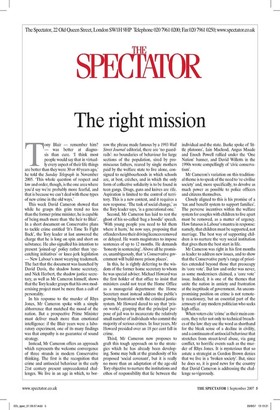The right mission
TonyBlair — remember him? — was better at diagnosis than cure. 'I think most people would say that in virtually every aspect of their life things are better than they were 30 or 40 years ago,' he told the Sunday Telegraph in November 2005. 'This whole question of respect and law and order, though, is the one area where you'd say we're probably more fearful, and that is because we can't deal with these types of new crime in the old ways.'
This week David Cameron showed that while he grasps this grim trend no less than the former prime minister, he is capable of being much more than `the heir to Blair'. In a short document on Conservative plans to tackle crime entitled 'It's Time To Fight Back', the Tory leader at last answered the charge that he is long on spin and short on substance. He also signalled his intention to present `joined-up' policy rather than 'eyecatching initiatives' or knee-jerk legislation — New Labour's most wearying trademark. The fact that the document was launched by David Davis, the shadow home secretary, and Nick Herbert, the shadow justice secretary, as well as Mr Cameron himself, shows that the Tory leader grasps that his own modernising project must be more than a cult of personality.
In his response to the murder of Rhys Jones, Mr Cameron spoke with a simple abhorrence that matched the mood of the nation. But a prospective Prime Minister must deliver much more than emotional intelligence: if the Blair years were a laboratory experiment, one of its many findings was that empathy is no guarantee of sound strategy.
Instead, Mr Cameron offers an approach which represents the welcome convergence of three strands in modern Conservative thinking. The first is the recognition that crime and antisocial behaviour in the early 21st century present unprecedented challenges. We live in an age in which, to borrow the phrase made famous by a 1993 Wall Street Journal editorial, there are `no guardrails': no boundaries of behaviour for large sections of the population, sired by promiscuous fathers, reared by single mothers paid by the welfare state to live alone, consigned to neighbourhoods in which schools are, at best, crèches, and in which the only form of collective solidarity is to be found in teen gangs. Drugs, guns and knives are rife. Aspiration is limited to the control of territory. This is a new context, and it requires a new response. 'The task of social change,' as the Tory leader says, 'is a generational one.'
Second, Mr Cameron has laid to rest the ghost of his so-called 'hug a hoodie' speech. 'With young people you need to hit them where it hurts,' he now says, proposing that offenders have their driving licences removed or delayed. He wants magistrates to impose sentences of up to 12 months. He demands 'honesty in sentencing'. Above all he promises, unambiguously, that 'a Conservative government will build more prison places'.
In this, he is rightly deferring to the wisdom of the former home secretary to whom he was special adviser. Michael Howard was the first holder of that office to insist that ministers could not treat the Home Office as a managerial department: the Home Secretary must instead address the public's growing frustration with the criminal justice system. Mr Howard dared to say that 'prison works', grasping that the principal purpose of jail was to incarcerate the relatively small number of individuals who commit the majority of serious crimes. In four years, Mr Howard presided over an 18 per cent fall in crime.
Third, Mr Cameron now proposes to graft this tough approach on to the strategies which he has already been developing. Some may balk at the grandiosity of his proposed 'social covenant', but it is really no more than an adaptation of the age-old Tory objective to nurture the institutions and ethos of responsibility that lie between the individual and the state. Burke spoke of 'little platoons', lain Macleod, Angus Maude and Enoch Powell rallied under the 'One Nation' banner, and David Willetts in the 1990s wrote compellingly of 'civic conservatism'.
Mr Cameron's variation on this traditional theme is to speak of the need to 're-civilise society' and, more specifically, to devolve as much power as possible to police officers and citizens themselves.
Closely aligned to this is his promise of a 'tax and benefit system to support families'. The perverse incentives within the welfare system for couples with children to live apart must be removed, as a matter of urgency. How fatuous is Labour's mantra in response: namely, that children must be supported, not marriage. The best way of supporting children is to nurture the very social institution that gives them the best start in life.
Mr Cameron was right in his first months as leader to address new issues, and to show that the Conservative party's range of priorities extended beyond those that preoccupy its 'core vote'. But law and order was never, as some modernisers claimed, a 'core vote' issue. Indeed, it is one of the themes that unite the nation in anxiety and frustration at the ineptitude of government. An uncompromising position on crime is not remotely reactionary, but an essential part of the armoury of any modern politician who seeks high office.
When voters cite 'crime' as their main concern, they refer not only to technical breaches of the law: they use the word as shorthand for the bleak sense of a decline in civility, and a continuum of antisocial behaviour that stretches from street-level abuse, via gang conflict, to horrific events such as the murder of Rhys Jones. It is mysterious that so astute a strategist as Gordon Brown denies that we live in a 'broken society'. But, since he does so, it is good news for the country that David Cameron is addressing the challenge so vigorously.







































 Previous page
Previous page